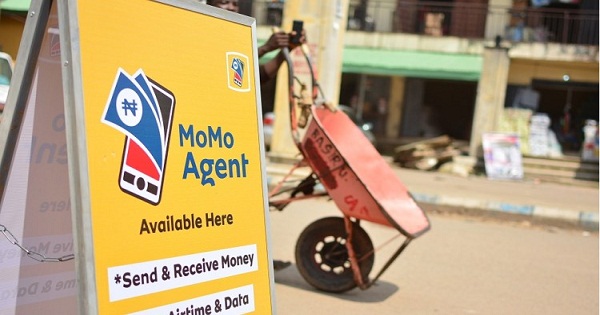Telecom
MTN Expands MoMo Service Offerings to Deepen Financial Inclusion Drive

The Y’ello Digital Financial Services (YDFS) has announced the expansion of its MoMo products and services, in a bid to deepen financial inclusion in Nigeria.
As part of the expansion, ‘MoMo Agent’ has been upgraded with bill payment, cash deposit and withdrawal, as well as data and airtime purchase components.
Upgrades also include bulk disbursement services enabling public and private companies to make payments en masse anywhere in Nigeria without a bank account, ATM availability or bank branch.
According to a 2018 Access to Financial Services Survey by Enhancing Financial Innovation and Access (EFInA), 36.6 million adults, representing 36.8% of Nigeria’s adult population, are financially excluded.
The Federal Government, through the Central Bank of Nigeria (CBN), announced plans to ensure that 80% of Nigerian adults are financially included by 2020.
YDFS is one of the leading Nigerian entities working to accelerate the CBN’s financial inclusion drive.
Commenting on the expansion, Usoro Usoro, chief executive officer of YDFS, said, “I am excited to announce the expansion to our MoMo Agent service.
“Our goal is to reach every underbanked and unbanked person in Nigeria, and we are focused on achieving that.
“Anyone, anywhere in Nigeria can handle financial transactions within their neighbourhood.
“This is our goal to reach Nigerians everywhere, enriching lives and supporting the Federal Government’s financial inclusion drive.”
With an agent base of more than 150, 000 and growing, the ‘MoMo Agent’ service is licensed by the Central Bank of Nigeria to recruit agents to provide financial services within communities on behalf of banks.
YDFS, a subsidiary of MTN Nigeria, launched ‘MoMo Agent’ services to provide safe and accessible money transfer services to financially underserved communities across Nigeria.
These expansions come as YDFS leverages its vast distribution network to disburse funds to beneficiaries at the last-mile, including towns and villages in all local government areas across the country.
Telecom
Again, Labour Fumes, Threatens Shutdown of Telcos over Non-Implementation of 15 Percent Tariff Reduction

Nigeria Labour Congress (NLC) is threatening to shut down operations of telecommunications companies over their refusal to comment on the 15 percent reduction in telecom tariffs.

Recall that that organised labour, through the NLC, forced the federal government and NCC to reduce the telecommunications tariff hike from 50% to 35% after threatening to shut down telecom operations and the NCC in response to what it saw as exploitative economic policies amidst excruciating suffering, hardship, and deepening poverty.
The government had previously formed a 10-member committee, consisting of five government and NLC representatives, to deliberate on the thorny topic of tariff hikes within two weeks and report back before making a final decision on the new telecom tariff structure.
Consequently, on Friday, February 21, 2025, the committee, at a meeting conducted in the office of the National Security Adviser (NSA) that lasted nearly three hours, decided on a 15 per cent tariff cut.
According to reports, in accordance with the conditions of the agreement, an official communiqué announcing the tariff reduction was scheduled to be released on Saturday, February 22.
According to Chronicle,iIt was said that the meeting began at 4:00 p.m. and concluded around 7:00 p.m., during which NLC representatives insisted that the tariff hike be withdrawn.
According to sources, after significant pressure from NLC representatives in the 10-man committee, the government and NCC gave up and agreed on the 15% decrease, which the government or NCC should have announced the next day.
However, at the time of this report, no such announcement has been made.
Leaders of the labour union are not taking the government’s failure to announce or implement the 15% tariff decrease lightly, suspecting that they have been duped.
The Labour leaders have therefore resolved to directly confront the NCC and telecommunications operators next week.
Though it has been reported that the date for the start of the industrial action against the NCC and telecom providers has been set and mobilisation is underway, the information is being closely guarded.
One of the leaders of the NLC stated that “We have received directives to commence mobilisation since last week. In fact, the date for the commencement of industrial action against the NCC and telecommunication operators’ offices across the country has been fixed. We have been warned not to disclose the date because the plan is to take all concerned by surprise. We are not giving any notice because we thought we had resolved this matter over a month ago. It is as if we have been scammed. Therefore, we have decided to confront the matter head-on.”
On February 12, the NLC expressed outrage over telecommunications companies’ tariff hikes, despite an earlier agreement with the Federal Government and the NCC.
According to the Labour union, “If the telecommunications companies fail to revert to the old tariff by the end of February 2025, a total shutdown of their operations nationwide will commence on March 1, 2025.”
To demonstrate its seriousness, the NLC declared that, as a first step in resisting the arbitrary tariff hike, it directed that workers and other willing citizens boycott the services of MTN, AIRTEL, and GLO daily between 11:00 a.m. and 2:00 p.m. until the end.
On Tuesday, February 11, NLC leaders issued a communiqué at the conclusion of their Central Working Committee (CWC) meeting in Lokoja, Kogi State, urging workers and citizens to suspend data purchases from telecommunications companies, which have also become one of their most effective tools for exploiting Nigerian citizens.
The communiqué, signed by Joe Ajaero and Emma Ugboaja, Congress’ President and General Secretary, respectively, instructed NLC State Councils and industrial union affiliates to quickly sensitise and mobilise their members and the general public in their jurisdictions.
Telecom
Ebehijie Momoh, CEO of AfriGOPay to Deliver Keynote at PAFON 2.0

Ebehijie Momoh (Mrs), the Managing Director and Chief Executive Officer of AfriGOPay Financial Services Limited (AFSL), a subsidiary of NIBSS, has been announced as the keynote speaker for the second edition of Payments Forum Nigeria (PAFON 2.0).

PAFON 2.0 Ads
PAFON 2.0 will be held on Thursday, April 10, 2025 at the Function Room 1, Oriental Hotel, Lekki Road, Lagos by 9am (WAT).
Register here to attend: https://shorturl.at/IPOjA
The keynote speaker alongside the special guest, Uche Uzoebo, the MD/CEO of SANEF, and others lined-up for the Forum, will focus on the theme: “Bridging the Customer Experience Gap for Financial Inclusion Using AI”, which underscores the urgent need to safeguard digital transactions against emerging threats while ensuring seamless financial inclusion and innovation.
Mrs Momoh is leading AfriGO vision to deliver a seamless, secure and efficient payment card scheme which facilitates faster transactions, reduces card operating costs to enhance the overall user experience for stakeholders, partners, and cardholders.
With over 30 years of progressive leadership experience in the Nigerian financial and payment industry, she has a distinguished career marked by strategic vision and a commitment to delivering exceptional results.
She has consistently demonstrated her ability to drive large-scale operations, enhance profit and loss growth, and lead high-performance teams.
Also, Mrs. Uche Uzoebo is a passionate and renowned expert in financial inclusion, digital transformation, inclusive finance and women empowerment in Nigeria.
Under her leadership, SANEF Limited is committed to achieving excellence, greater growth, development and expansion to stakeholders in the ecosystem.
Speaking ahead of PAFON 2.0, Mr. Chike Onwuegbuchi, the co-convener, stated: “As Nigeria accelerates its transition to a digital economy, ensuring trust and security in payments has never been more critical. PAFON 2.0 will serve as a pivotal platform to address these challenges and unlock opportunities for a more resilient and inclusive financial system.”
PAFON 2.0 is open to payment service providers, fintech firms, banks, regulatory bodies, cybersecurity experts, and all stakeholders invested in the future of digital transactions in Nigeria.
Attendance
Register to Attend: https://shorturl.at/IPOjA
Telecom
Everything You Need to Know About MTN’s MIP 2025 Fellowship Webinar

As the MTN Media Innovation Program (MIP) 2025 prepares for another cohort, aspiring applicants have a unique chance to gain firsthand insights into this transformative fellowship. On Friday, March 28, 2025, at 11:00 AM WAT, MTN Nigeria, in partnership with the School of Media and Communication (SMC) at Pan-Atlantic University (PAU), will host a webinar featuring past fellows and PAU faculty. The session will explore the program’s curriculum, application process, and the career-defining opportunities it offers for media professionals.

The webinar, designed for journalists, broadcasters, content creators, and digital storytellers, will offer a deep dive into the fellowship’s structure, the curriculum, hands on practicals and also what to expect during the international study visit to South Africa, and how the program equips media professionals with the skills needed to thrive in an evolving industry.
For many media professionals, the MIP fellowship has been a turning point. Past fellows will share personal experiences, discussing how the training at PAU, exposure to global media practices, and networking opportunities with industry leaders helped shape their careers.
The speakers include Sakina Ahmad, a graduate of the Kano State Polytechnic and a reporter at FRCN, Fombina Fm Yola. Frank Eleanya, a senior reporter at TechCabal, and a seasoned technology and innovation journalist with extensive coverage of the Nigerian and West African tech ecosystems and Ebunoluwa Dosumu, award-winning TV presenter and producer, a content creator/brand strategist at WorldPR Media. Nifemi Oguntoye, the deputy head of presentation at TVC Communications will also speak during the session.
Dr. Ikechukwu Obiaya, Dean of the School of Media and Communication at PAU, emphasised the program’s commitment to nurturing media professionals: “Given the challenges of today’s fast-changing media space, there is an ever-greater urgency to cultivate a new generation of media professionals who will drive innovation and excellence to meet today’s media needs. SMC will leverage its extensive experience in training media professionals to equip this next cohort. And we will do this with our usual emphasis on creativity and ethics.”
With thousands of applications expected, the webinar will also walk participants through the step-by-step application process, offering tips on how to craft a compelling application, what the selection committee looks for, and how to stand out as a candidate.
Faculty members from PAU’s School of Media and Communication, who play a key role in the program’s curriculum, will also shed light on the learning modules, workshops, and hands-on training that MIP fellows receive.
The MIP webinar is free and open to all media professionals, offering a rare chance to engage with alumni, faculty, and MTN executives in an interactive session.
As the application window for MIP 2025 remains open, this webinar serves as the ultimate guide for anyone looking to take their media career to the next level. With limited spots available for the fellowship, attendees are encouraged to come prepared with their questions and seize this opportunity to gain exclusive insights into one of Nigeria’s most prestigious media fellowships.
Interested journalists, bloggers, and content creators can apply for the MIP 2025 at https://bit.ly/MTN_MIP2025 and can register here for the MIP Webinar.

 E-Business2 days ago
E-Business2 days agoFG Plans to Link Social Register to NIN for Humanitarian Crisis

 Broadcasting2 days ago
Broadcasting2 days agoWe’re Confident in the Super Eagles – Karl Toriola

 Telecom2 days ago
Telecom2 days agoKeystone Bank Seeks to Join Suit in Tussle over 9Mobile Shares Ownership

 E-Financial2 days ago
E-Financial2 days agoFG to Harmonise Fiscal Data Across MDAs

 E-Business2 days ago
E-Business2 days agoFive WhatsApp Business Features Every Small Business Should Be Using

 News2 days ago
News2 days agoSenate Probes Federal Character Violations by NDIC, Others

 E-Financial2 days ago
E-Financial2 days agoZumax Files N4.1Bn Suit against CBN over ‘Fraudulent’ Receivership

 News1 day ago
News1 day agoCourt Throws Out Falana’s Fraud Case against Ekeh, Zinox Boss and Others



























